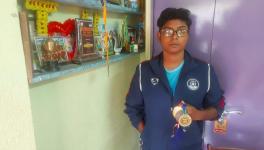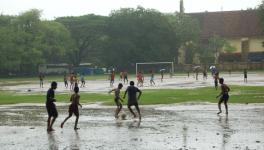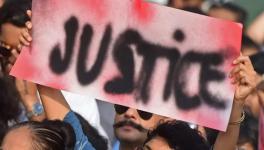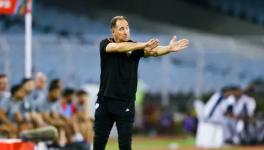Mohammed Habib: Indian Football’s First True Professional
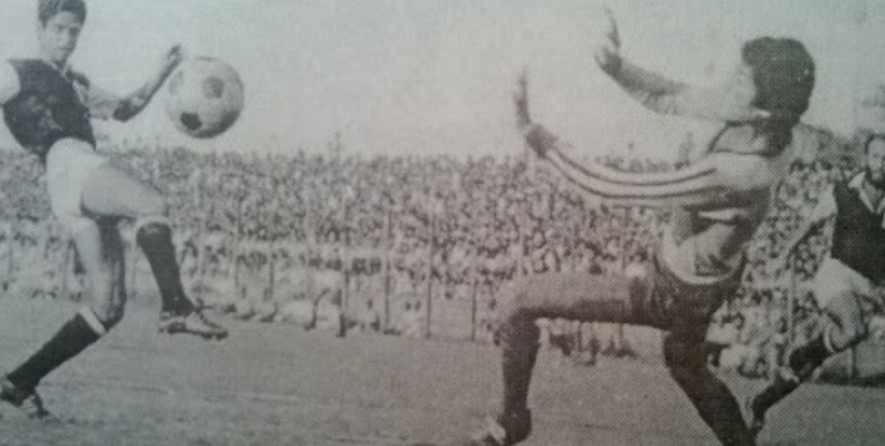
Having played for all three big teams in Kolkata, Mohammed Habib (left) was the uncrowned “king” for close to two decades. There was a time when he was considered the last word in Kolkata football despite the presence of many other stars (Pic: TheHardTackle).
Mohammed Habib was born far ahead of his time in Indian football.
To talk about ushering in “true professionalism” is the favourite pastime of Indian football officials these days, though without much achievement to justify the hullabaloo. But in the 1960s, when the whole setup was entirely amateur, both in outlook and practice, Habib stood alone with his exclusive idea of professionalism.
To merely say that for 17 seasons, starting 1966-67, Hyderabad-born Habib played football in Calcutta (now Kolkata), would be a gross understatement. In fact, he ruled the city’s football in a manner which no outstation player could ever do in the Mecca of Indian football. Having played for all three big teams, Habib was the uncrowned “king” for close to two decades. There was a time when he was considered the last word in Kolkata football despite the presence of many other stars.
Also Read | The Troll Comes Full Circle for Virat Kohli and How
To achieve this, the Arjuna awardee framed his own rules, which was not easy to follow, especially more than five decades ago. Those were the days when clubs used to pay paltry annual fees to their players in the guise of professionalism. Instead, the clubs liberally used their contacts to help footballers land jobs in government departments, nationalised banks and Public Sector Undertakings to have a secured career in later days.
Habib refused any such offer and never took up any job. He remained a professional in true sense throughout his career. He considered playing football was his job – and to do it properly, he didn’t want any distraction. Habib was probably the country’s first professional footballer at the highest level.
However, it only helped him achieve legendary status during his playing days and it didn’t come to his rescue once he hung up his boots. Today, Habib, pushing 75, and staying in Hyderabad, is extremely ill. Struck by dementia, the ever-agile Habib, once a terror for the defenders, mostly fails to recognize known faces. To add to it, he is also suffering from Parkinson’s disease.
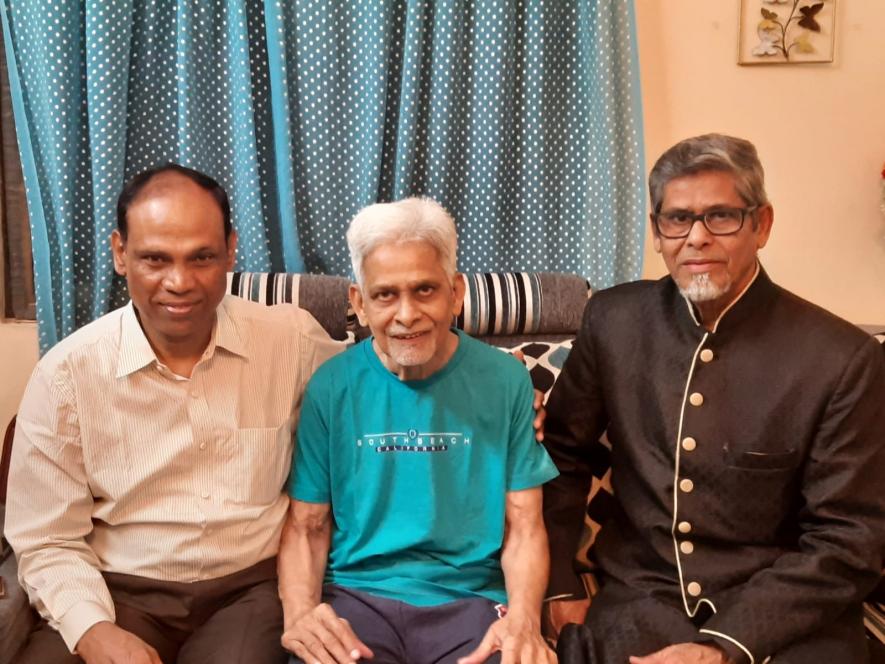
Indian football legend Mohammed Habib flanked by Victor Amalraj (left) and brother Mohammed Akbar.
Habib’s younger brother, Mohammed Akbar, a former international, had recently returned from the US. He said: “I too played for all three Kolkata giants and four times finished top scorer in the CFL. But I also was a central government employee and right now I draw a pension.
“Habib bhai enjoys no such facilities. He worked as a coach at Tata Football Academy for a little over 10 years after retiring from football. That’s the only time in his life when he had a full-time job.”
Akbar said Habib, thankfully, doesn’t have financial problems because his children are well-settled in life. His four daughters are happily married and the only son is working in Australia. “Inshallah, his children are taking great care of their parents,” he said.
Yet, his contemporaries and those who know him for a long time, feel pained looking at Habib’s condition. “I can’t believe that Mohammed Habib would sit all day with a blank look on his face and would often fail to recognize people,” said former international Subash Bhowmick, who considers Habib the “most courageous” player in the history of Indian football. “He feared nobody on the field. His discipline, attitude and fearlessness once made him the model to all of us,” he added.
Also Read | Boxer Nikhat Zareen Ready for the World, Mary Kom Notwithstanding
Habib’s exploits on the field had become part of Indian football’s folklore. In the 1970 Bangkok Asian Games, India were pitted against Thailand in the opener and were down by two goals within half an hour. India finally snatched a point from the hosts -- it was Habib, who led the revival. His teammates still recall how he sternly told his teammates to either pull up their socks or to drop dead on the pitch.
Playing football was the biggest pride in the life of the striker, who led India in the 1972 pre-Olympics. In 1977, when Mohun Bagan played Pele’s Cosmos club in an exhibition tie at Eden Gardens, the footballers in green and maroon jersey were all busy looking for an opportunity to have a photograph clicked with the Brazilian great. Habib was the only exception.
He reportedly told his teammates, “Please concentrate on the match. Pele is absolutely great, but he too plays football like us. And here, he has come to play a football match against us.” Habib gave such a wonderful display that Pele praised him after the match ended in a 2-2 draw.
A bronze medallist in the 1970 Asian Games, several of Habib’s exploits in the domestic circuit have remained unmatched till date. He is the only player in history, who scored winning goals in three Durand Cup finals. East Bengal won the Durand in 1967-68 (beat BNR 1-0), in 1970-71 (beat Mohun Bagan 2-0), and in 1972-73 (beat Mohun Bagan 1-0). All four goals were struck by Habib.
Primarily a schemer and playmaker, Habib invariably controlled the game in the middle whichever team he played for. Yet, he used to be extremely effective as a scorer in crucial outings. His best was seen in the 1969-70 Santosh Trophy in Nowgong.
Before Nowgong Nationals, Bengal went without any silverware for six years in a row that created a huge uproar in the state. In Nowgong, IFA decided to send a team composed of local youngsters and kept out the outstation players. In the double-legged semifinal and final, Bengal starting XI had all local boys, except for Habib.
Probably to prove his worth, Habib emerged top scorer in the tournament. In the final, Bengal outclassed Services 6-1 with Habib alone netting five goals, a record in the history of the National championship.
Habib was a 19-year-old boy when he helped Andhra Pradesh win the Santosh Trophy in February 1966 in Kollam. East Bengal officials, who were present there, signed him almost immediately. He was such a huge hit in Kolkata within a year that there was a riot-like situation in front of the IFA office when Mohun Bagan tried to snatch him away during the next transfer season.
Former India and Mohun Bagan stopper back Pradeep Chowdhury said: “Habib bhai was totally committed to football. He would never indulge in indiscipline and would tolerate none. While playing for Mohun Bagan, in innumerable matches, we could overcome tough situations because of his indomitable spirit and determination. In my eyes, there was no better professional than him.”
Another former India footballer Victor Amalraj says: “Habib bhai is the biggest fighter I have come across in my career. When I finally had the opportunity to play along with him in Mohammedan Sporting, he was in the twilight of his career. Still, I learned from him how to play under pressure and go for counter attacks.
“Once during a CFL match, I allowed a photographer to take my photograph. After the match was over, Habib bhai scolded me. He told me never should I see you again doing this. You are here to play professional football, not to pose for photographs,” recalls Amalraj.
If Indian football in the 1970s and 1980s was rich and attracted huge crowds, it was chiefly because of characters like Mohammed Habib. But now that his health is in a helpless state, no one has extended any help – neither the government, nor the clubs he assisted to win trophies season after season.
True, Habib and his family have not asked for any assistance as they feel it would be below their dignity. As Akbar said: “My elder brother has played football with his head high on the pitch. I sincerely hope people remember his immense contribution to Indian football.”
Get the latest reports & analysis with people's perspective on Protests, movements & deep analytical videos, discussions of the current affairs in your Telegram app. Subscribe to NewsClick's Telegram channel & get Real-Time updates on stories, as they get published on our website.









